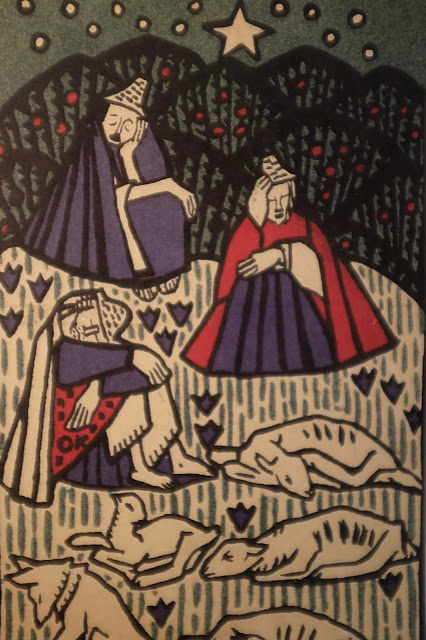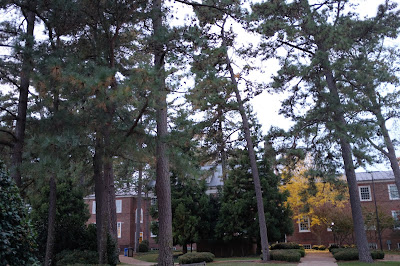Oskar Kokoschka (1886 - 1980)
Drei Hirten, Hund und Schafe. Sleeping Shepherds with Their Flock
Weiner Werkstaette, 1908, color lithograph
Oskar Kokoschka was born in
Poechlarn, Austria, 100 km west of Vienna, in 1886. His father was a traveling salesman and
financial difficulties forced the family to move often. Oskar studied art at the Kunstgewerbeschule (The
University of Applied Arts) in Vienna from 1904-1908. His long and productive career spanned
decades (from 1905 to 1975) and many media:
painting, drawing, poetry, theater, printmaking, sculpture, portraiture,
and teaching.
Oskar Kokoschka had strong and
lasting friendships, with teachers, artists, people he painted and others. He also seems to have been good at developing
relationships with mentors, dealers and patrons. His life was marked by a passionate affair
with Alma Mahler, who left him for Walter Gropius in 1915. In despair, Kokoschka signed up to fight in
WW I. He was severely injured and
suffered for years after the war. He
said later: “War was appalling, I
didn’t know if I would ever get out alive, but if I did, I would climb the
highest peak to see what motivates people to sacrifice their life for no
reason.”
Political upheaval and war forced
Kokoschka to leave Austria for Czechoslovakia and then England. He chose to live in Switzerland after the war
and continued to travel all over the world, for art and because of his
commitment to peace, refugees and young people.
An outspoken critic of Nazis and
fascism and concerned with the predicaments of refugees from those regimes,
Kokoschka believed that art could counter such power. He never painted completely abstractly like
some of his avant-garde colleagues. He
felt that for art to be as powerful as possible it needed to maintain a
reference to the concrete world we live in.
"I simply wanted to
create around me a world of my own in which I could survive the progressive
disruption going on all over the world. If this my world will survive me, so
much the better….”
I myself see no cause to retrace my
steps. I shall not weary of testifying
by the means given to me by nature and expressed in my art, in which only
vision is fundamental, not theories. I
consider myself responsible, not to society, which dictates fashion and taste
suited to its environment and its period, but to youth, to the coming
generations, which are left stranded in a blitzed world, unaware of the Soul
trembling in awe before the mystery of life.
I dread the future, when the growth of the inner life will be more and
more hampered by a too speedy adaptation to a mechanically conceived
environment, when all human industry is to be directed to fit in with the
blue-prints.
Individually, no one will see his way before
him. The individual will have to rely on
hearsay for his knowledge, on second-hand experience, on information inspired
by scientific inquiry only. None will
have a vision of the continuity of life, because of the lack of spiritual means
to acquire it.
For the growth of the inner life can never be
brought into any scientific formula, whatever the technician and the scientist
of the soul may try. The life of the
soul is expressed by man in his art. (Do
we not already need experts to lecture us on how to see a modern work of
art?) The mystery of the soul is like
that of a closed door. When you open it,
you see something that was not there before.
Do not fear that I intend to lead you right
off into metaphysics, whereas you only asked me for an introduction to the
exhibition of my work. But if I were not
a painter I could explain it all fully in words. So there we are.”
Very sincerely
yours, Oskar Kokoschka
Introduction to Retrospective Catalogue, MOMA 1948























